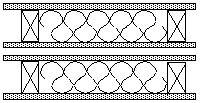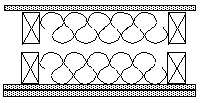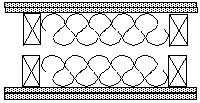
Below are the STC ratings of various wall assemblies, each presented to help illustrate concepts, improvements and rules of thumb. The estimated ratings are based on laboratory test results from various compendiums of STC ratings. It is recommended to consult a professional acoustician for more detailed information or to analyze the specifics of your project/assembly.
To view different wall assemblies, click on each point below that may apply to your project.
1. Insulation will noticeably improve the STC rating of an assembly.
2. Staggered or double stud walls are higher rated than single stud walls.
3. Metal stud walls perform better than wood stud walls.
4. Resilient channel can improve the STC rating of an assembly.
5. Adding additional layers of drywall can improve the STC rating of an assembly.
6. Drywall between double studs can dramatically reduce the STC rating of an assembly.
1. Insulation will noticeably improve the STC rating of an assembly.
Description | Estimated
STC Rating | Wall Assembly |
3 5/8" metal
studs, 5/8" gyp (2 layers total), No insulation | 38
- 40 |  |
3 5/8" metal studs,
5/8" gyp (2 layers total), Batt insulation | 43
- 44 |  |
2. Staggered or double stud walls are higher rated than single stud walls.
Description | Estimated
STC Rating | Wall Assembly |
2x4
stud, 5/8" gyp (2 layers total), Batt insulation | 34
- 39 |  |
Staggered
studs, 5/8" gyp (2 layers total), Batt insulation | 46
- 47 |  |
2x4
studs, 5/8" gyp (2 layers total), Batt insulation | 56
- 59 |  |
3. Metal stud walls perform better than wood stud walls.
(NOTE: This only applies to single stud assemblies. For double stud assemblies, there is virtually no difference.)
Description | Estimated
STC Rating | Wall Assembly |
2x4
stud, 5/8" gyp (2 layers total), Batt insulation | 34
- 39 |  |
3
5/8" metal studs, 5/8" gyp (2 layers total), Batt insulation | 43
- 44 |  |
4. Resilient channel can improve the STC rating of an assembly.
(NOTE: These ratings are based on laboratory tests. Because of the special care required when installing resilient channels, actual results could be substantially lower.)
Description | Estimated
STC Rating | Wall Assembly |
2x4
stud, 5/8" gyp (2 layers total), Batt insulation | 34
- 39 |  |
2x4
stud, 5/8" gyp (2 layers total), Resilient Channel, Batt insulation | 45
- 52 |  |
5. Adding additional layers of drywall can improve the STC rating of an assembly.
Description | Estimated
STC Rating | Wall Assembly |
2x4
stud, 5/8" gyp (2 layers total), Batt insulation | 34
- 39 |  |
|
2x4 stud,
5/8" gyp (3 layers total), Batt insulation
| 39
- 40 |  |
2x4
stud, 5/8" gyp (4 layers total), Batt insulation | 43
- 45 |  |
6. Drywall between double studs can dramatically reduce the STC rating of an assembly.
Description | Estimated
STC Rating | Wall Assembly |
2x4
studs, 5/8" gyp (4 layers total), Batt insulation | 44
- 45 |  |
2x4
studs, 5/8" gyp (2 layers total), Batt insulation | 56
- 59 |  |
2x4
studs,5/8" gyp (3 layers total), Batt insulation | 59
- 60 |  |
2x4
studs, 5/8" gyp (4 layers total), Batt insulation | 58
- 63 |  |
Rules of Thumb
Recommended Ratings
Weaknesses - What You Should Know
The difference between STC and NRC
STC Ratings for Masonry Walls
Home
Copyright
© 2004 Acoustics.com
